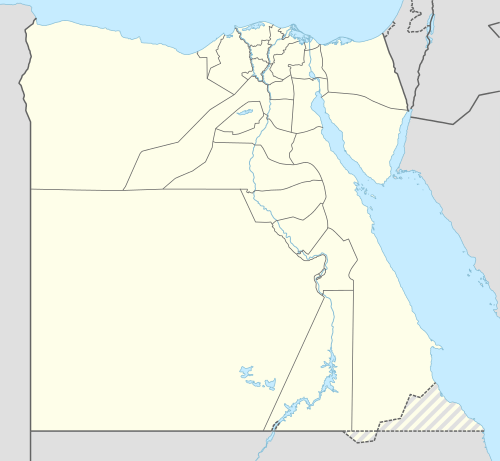WV23
| WV23 | |||
|---|---|---|---|
| Burial site of Ay | |||
 The wall decorations of WV23 | |||
 WV23 | |||
| Coordinates | 25°44′28.8″N 32°35′31″E / 25.741333°N 32.59194°ECoordinates: 25°44′28.8″N 32°35′31″E / 25.741333°N 32.59194°E | ||
| Location | West Valley of the Kings | ||
| Discovered | 1816 | ||
| Excavated by | Giovanni Battista Belzoni | ||
|
| |||
Tomb WV23, located at the end of the Western Valley of the Kings near modern-day Luxor, was the final resting place of Pharaoh Ay of the 18th Dynasty.
Discovered by Giovanni Battista Belzoni in the winter of 1816, its structure is similar to that of the tomb of Akhenaten, with a straight undecorated, descending corridor, leading to a "well chamber" that has no shaft. This leads to the burial chamber, which currently contains the reconstructed sarcophagus. It had originally been found smashed into numerous fragments. The tomb had also been desecrated in history with many depictions of Ay's image or name erased from the tomb wall paintings.
Its decoration is similar in content and colour to that of Tutankhamun (KV62), with a few differences. On the eastern wall there is a depiction of a fishing and fowling scene, which is not shown elsewhere in other Royal tombs, being normally shown in burials of nobility. The tomb is also well known for its scenes of a hippopotamus hunt.

| “ | .. contains a broken sarcophagus and some bad fresco painting of peculiarly short and graceless proportions. | ” |
References
- Reeves, N & Wilkinson, R.H. The Complete Valley of the Kings, 1996, Thames and Hudson, London.
- Siliotti, A. Guide to the Valley of the Kings and to the Theban Necropolises and Temples, 1996, A.A. Gaddis, Cairo.
External links
| Wikimedia Commons has media related to WV23. |
- Theban Mapping Project: KV23 - Includes detailed information about tomb.